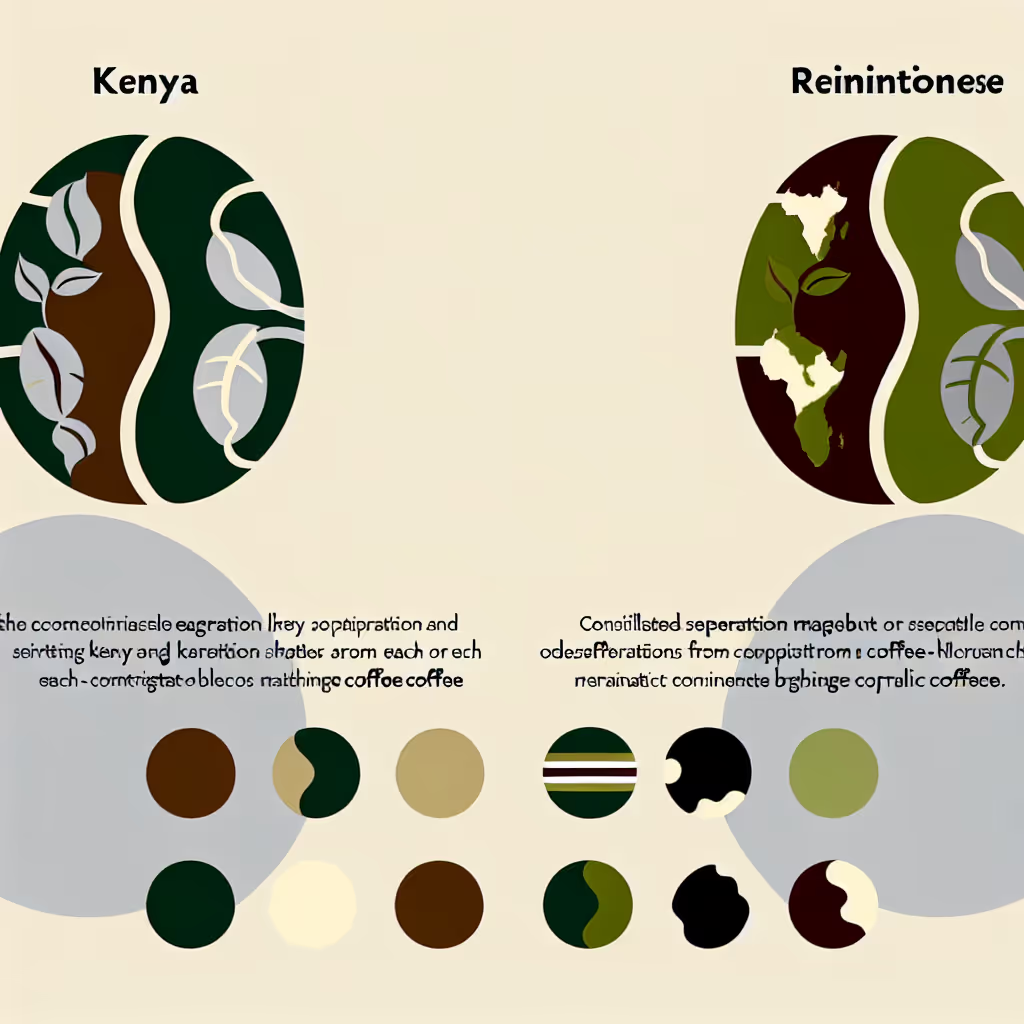Kenyan Vs. American Coffee
This comparison explores the distinct qualities of Kenyan and American coffee, focusing on their flavor profiles, growing conditions, and brewing methods. Learn how these factors contribute to each origin's unique taste and aroma.

Brief Description
Kenyan coffee is renowned for its bright acidity, full body, and complex flavor profile. Grown in the rich volcanic soils of the Central Highlands, these beans benefit from ideal climate conditions and meticulous processing. The result is a cup that's bold, wine-like, and often described as the 'connoisseur's choice'. With notes ranging from blackcurrant to citrus, Kenyan coffee offers a truly unique and memorable tasting experience.
American coffee, particularly from Hawaii's Kona region, is renowned for its smooth, clean taste and subtle complexity. Grown on the volcanic slopes of the Big Island, Kona coffee benefits from ideal climate conditions, rich soil, and meticulous cultivation practices. The result is a premium coffee with a distinct flavor profile that has earned global recognition and a devoted following among coffee enthusiasts.
Importance of Comparison
Comparing Kenyan and American coffee is crucial for coffee enthusiasts seeking to expand their palate and understand the nuances of different origins. This comparison helps buyers make informed decisions based on flavor preferences, brewing methods, and production practices. It also highlights the cultural significance and unique characteristics of each origin, providing valuable insights for both casual drinkers and connoisseurs.
Key Attributes
Origin
Kenyan
American


Consumer Guide
When choosing between Kenyan and American coffee, consider your flavor preferences. Kenyan coffee offers a bold, wine-like taste with bright acidity and notes of blackcurrant and citrus. It's ideal for those who enjoy a complex, full-bodied cup. American coffee, particularly from Hawaii's Kona region, provides a smoother, cleaner taste with subtle complexity and notes of bright citrus and nuts. For brewing, both origins excel in pour-over and French press methods. Kenyan coffee's high acidity makes it a great choice for cold brew, while American coffee's smoothness works well across various brewing techniques. Consider the altitude difference: Kenyan coffee grows at higher elevations (1400-2100m), contributing to its intense flavors, while American coffee grows at lower altitudes (300-900m), resulting in a milder profile.
Expert Opinions
Coffee expert James Hoffmann notes, 'Kenyan coffee is often described as the wine of the coffee world, with its complex acidity and fruity notes. American Kona, on the other hand, offers a uniquely clean and balanced cup.' Barista champion Lem Butler adds, 'The double fermentation process used in Kenya contributes to its distinctive flavor, while the volcanic soils of Hawaii impart a subtle minerality to Kona coffee. Both origins showcase the importance of terroir in coffee production.'
FAQs
Kenyan coffee is known for its bright acidity, full body, and complex flavor profile with notes of blackcurrant and citrus. American coffee, particularly Kona, offers a smoother, cleaner taste with subtle complexity, featuring bright citrus and nutty notes. Kenyan coffee tends to be bolder and more wine-like, while American coffee is generally milder and more balanced.
Kenyan coffee is grown at higher altitudes (1400-2100m) in volcanic soils, contributing to its intense flavors and acidity. American Kona coffee is grown at lower altitudes (300-900m) on volcanic slopes, resulting in a milder profile. The different climates and soil compositions play a significant role in shaping the unique characteristics of each origin.
Both Kenyan and American coffees excel in pour-over and French press methods. Kenyan coffee's high acidity makes it particularly suitable for cold brew, while American coffee's smoothness allows it to perform well across various brewing techniques. Experiment with different methods to find your preferred way of highlighting each origin's unique qualities.
Kenyan coffee typically undergoes washed processing, double fermentation, and sun-drying, which contribute to its clean, bright flavor profile. American coffee, particularly Kona, is processed using washed, natural, and honey methods. These diverse processing techniques allow for a range of flavor expressions in American coffee.
Kenya produces significantly more coffee annually, with approximately 50,000 metric tons. In contrast, American Kona coffee has a much smaller annual production of about 2,500 metric tons. This difference in scale affects availability and pricing, with Kona coffee often being more exclusive and expensive due to its limited production.
While both origins can be used for espresso, Kenyan coffee's bright acidity and full body can create a complex, vibrant espresso shot. American Kona coffee's smoothness and subtle flavors may result in a more balanced, less intense espresso. Personal preference plays a significant role in choosing between the two for espresso-based drinks.
Conclusion
Kenyan and American coffees offer distinct experiences for coffee lovers. Kenyan coffee stands out with its bright acidity, full body, and complex flavor profile, making it a favorite among those who appreciate bold, wine-like coffees. American coffee, particularly Kona, provides a smoother, more subtle experience with its clean taste and balanced complexity. Both origins showcase the importance of terroir, processing methods, and growing conditions in shaping coffee flavors. Whether you prefer the intense, fruity notes of Kenyan coffee or the smooth, nutty characteristics of American coffee, exploring these origins will undoubtedly enrich your coffee journey and help you discover new favorites.






